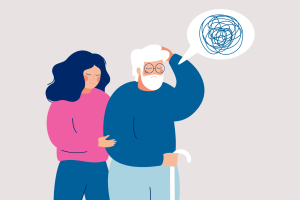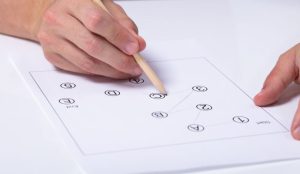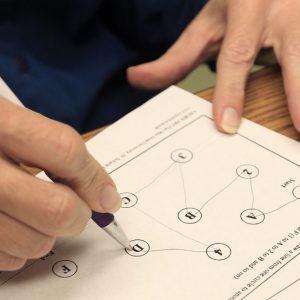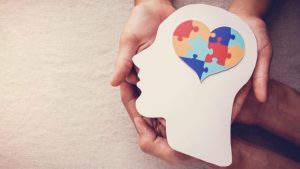Do you know how well you know your brain? There is a dementia test that can help you find out. This test is designed to measure your memory, language skills, and ability to think abstractly. It is important to take the test if you are concerned about your cognitive health. In this blog post, we will discuss the test in detail and provide tips on how to improve your results.
Contents
- 1 What Is Dementia?
- 1.1 Dementia Symptoms
- 1.2 How Do We Test Dementia?
- 1.3 The Dementia Test
- 1.4 Goals Of Dementia Test
- 1.5 How Does A Dementia Test Look Like?
- 1.6 What Do The Results Mean?
- 1.7 Sample Questions In A Dementia Test
- 1.8 Tips For Taking The Dementia Test
- 1.9 Benefits Of Taking Dementia Test
- 1.10 Relevance Of Dementia Test
- 1.11 Treatment Options For Dementia
- 1.12 Helping Someone To Deal With Dementia
- 2 Conclusion
- 3 A Word From Therapy Mantra
What Is Dementia?

Dementia is a brain disorder that affects your ability to think, remember, and communicate. It can also affect your ability to take care of yourself. Dementia is caused by damage to the brain cells. This damage can be from a number of different things, such as head injuries, strokes, or diseases like Alzheimer’s disease. This damage can be permanent or temporary.
Dementia Symptoms
The symptoms of dementia can be different for each person. They can also change over time. Some common symptoms include:
- Memory problems, such as forgetting things often or not being able to remember recent events
- Problems with thinking and reasoning, such as being confused about time, place, or what just happened
- Difficulty with communication, including being unable to find the right words or understanding what others are saying
- Problems with movement, such as having trouble walking or using the bathroom on their own
- Changes in mood and behavior, such as becoming irritable, depressed, or anxious.
How Do We Test Dementia?
There is no one test that can diagnose dementia. Your doctor will need to do a number of tests and ask you questions about your health history in order to make a diagnosis. If you or someone you know may have dementia, it is important to see a doctor.
The Dementia Test

The dementia test is designed to measure your memory, language skills, and ability to think abstractly. It is a short test that takes about 15 minutes to complete. You will be asked to do things like remember words, pictures, or objects; answer questions about time and money, and solve problems.
You can take the dementia test online or in person with a doctor or nurse. If you are taking the test online, be sure to print out the results and bring them to your next doctor’s appointment.
Goals Of Dementia Test
The goals of the dementia test are to:
- Help you understand how well you are doing cognitively: The dementia test can give you a snapshot of your current cognitive abilities. This information can be helpful if you are concerned about your memory or thinking skills.
- Help you track changes in your cognitive abilities over time: The dementia test can help you track any changes in your cognitive health over time. This information may be helpful to share with your doctor.
- Measure your memory, language skills, and ability to think abstractly: The dementia test measures your ability to remember things, understand language, and solve problems. This information can help you and your doctor understand which areas of cognition may be affected.
- See if there may be a problem with your thinking or memory that needs further evaluation: A doctor may use the results of the dementia test to determine if you need further evaluation for a brain disorder.
How Does A Dementia Test Look Like?

The dementia test is a short, 15-minute test that measures your memory, language skills, and ability to think abstractly. It is available online or in-person with a doctor or nurse.
- Questionnaire: The questionnaire asks about your memory, language skills, and ability to think abstractly. You will be asked to remember words, pictures, or objects; answer questions about time and money, and solve problems.
- Interviews: The interviews measure your ability to communicate and understand others. You will be asked to answer questions about yourself, such as your name, age, and where you live.
- Scoring: The dementia test is scored automatically by the computer. Your results will be compared to a database of people who have taken the test in the past. This will help give you a score for each of the three areas measured: memory, language skills, and ability to think abstractly.
What Do The Results Mean?
Your results from the dementia test will help you and your doctor understand how well you are doing cognitively. The results can also be used to track any changes in your cognitive abilities over time.
- If you score low on the memory test, it does not mean that you have dementia. It may just mean that your memory is not as good as someone who scores higher on the test.
- If you score low on the language skills test, it does not mean that you have dementia. It may just mean that your language skills are not as good as someone who scores higher on the test.
- If you score low on the ability to think abstractly test, it does not mean that you have dementia. It may just mean that your ability to solve problems is not as good as someone who scores higher on the test.
A doctor may use your test to see if you need more tests for a brain disorder.
Sample Questions In A Dementia Test
- What is the name of the president in office?
- How much money is in your checking account?
- What day of the week is it today?
- Can you tell me what this picture is of?
- What are two words that mean the same thing?
Tips For Taking The Dementia Test

Here are some tips for taking the dementia test:
- Be honest: It is important, to be honest when you are taking the dementia test. The questions in this test are meant to measure your abilities. It is important to answer them accurately.
- Take your time: You do not need to rush through the test. Take your time and read each question carefully.
- Use a pencil: If you are taking the test in person, use a pencil to answer the questions. This will help you keep track of your answers.
- Remember to bring the results with you to your next doctor’s appointment: The dementia test results can be helpful for your doctor as they work to make a diagnosis.
Benefits Of Taking Dementia Test
There are a number of benefits to taking the dementia test, including:
- Gaining a better understanding of your cognitive abilities: The dementia test can give you a snapshot of your current cognitive abilities. This information can be helpful if you are concerned about your memory or thinking skills.
- Tracking changes in your cognitive abilities over time: The dementia test can help you track any changes in your cognitive health over time. This information may be helpful to share with your doctor.
- Measuring your memory, language skills, and ability to think abstractly: The dementia test measures your ability to remember things, understand language, and solve problems. This information can help you and your doctor understand which areas of cognition may be affected.
- Getting a better understanding if you may have a problem with your thinking or memory: A doctor may use the results of the dementia test to determine if you need further evaluation for a brain disorder.
- Sharing information about brain health with loved ones: The dementia test can also help you share information about brain health with your loved ones. This information can help them better understand what you are going through and how they can support you.
Relevance Of Dementia Test
A dementia test is an important tool for assessing cognitive abilities. The information from this test can help you and your doctor better understand any changes in your thinking or memory. If you are concerned about your cognitive health, it is important to take the dementia test.
The dementia test can also help you share information about brain health with your loved ones. This information can help them better understand what you are going through and how they can support you. The results of the dementia test may also be helpful to your doctor as they work to make a diagnosis. If you are concerned about your cognitive abilities, it is important to take the dementia test.
Treatment Options For Dementia

There are a number of treatment options for dementia. Treatment options include:
- Medications: There are a number of medications that can help treat symptoms of dementia. Your doctor may prescribe medication to help improve your cognitive abilities.
- Therapies: There are a number of therapies that can help you manage the symptoms of dementia. These therapies may include cognitive stimulation therapy, reminiscence therapy, and art therapy.
- Support Groups: There are a number of support groups available for people with dementia. These groups can provide you with information and support.
- Education: It is important to receive education about dementia. This education can help you understand the disease and how to best manage it.
Receiving treatment for dementia can help improve your quality of life. If you are concerned about your cognitive abilities, it is important to discuss treatment options with your doctor.
Helping Someone To Deal With Dementia
If you have a loved one who is dealing with dementia, here are some tips for helping them:
- Provide support and understanding: Dementia can be a difficult disease to deal with. It is important to provide your loved one with support and understanding.
- Encourage them to stay active: Staying active can help improve mood and cognitive abilities.
- Encourage them to eat healthily: Eating healthy can help improve overall health and well-being.
- Create a supportive environment: A supportive environment can help your loved one feel comfortable and safe.
- Provide resources: There are a number of resources available for people with dementia. These resources can provide information and support.
If you have a loved one who is dealing with dementia, it is important to provide them with support. You can help by providing understanding, encouragement to stay active and eat healthily, and a supportive environment. There are also a number of resources available that can provide information and support.
Conclusion
Dementia is a broad category of brain disorders that cause a decline in memory or other thinking skills. Symptoms can include problems with language, communication, decision-making, and mobility. Dementia affects people of all ages, but it becomes more common as we get older. The good news is that there are ways to lower your risk of getting dementia. Early diagnosis can lead to the best possible care for you. Our new test can help you find out if you might have a problem and start taking steps to protect your mind.
A Word From Therapy Mantra
Your mental health — Your psychological, emotional, and social well-being — has an impact on every aspect of your life. Positive mental health essentially allows you to effectively deal with life’s everyday challenges.
At TherapyMantra, we have a team of therapists who provide affordable online therapy to assist you with issues such as depression, anxiety, stress, workplace Issues, addiction, relationship, OCD, LGBTQ, and PTSD. You can book a free therapy or download our free Android or iOS app.



